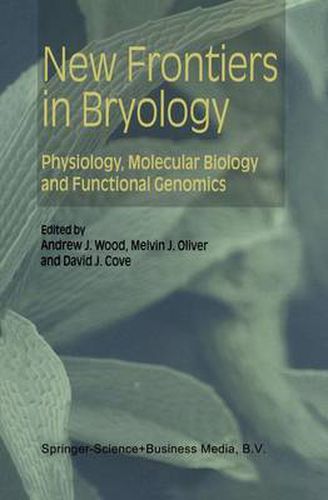Readings Newsletter
Become a Readings Member to make your shopping experience even easier.
Sign in or sign up for free!
You’re not far away from qualifying for FREE standard shipping within Australia
You’ve qualified for FREE standard shipping within Australia
The cart is loading…






The mosses (Bryophatea, Musci) are a diverse and widely distributed group of land plants. Mosses are attractive experimental plants because they exhibit the traditional attributes of good model systems (i.e. ease of growth and maintenance, fast generation time, and amenable genetics) with the added advantage of a haploid gametophyte that allowed developmental mutants to be recovered with relative ease. And, in one of the most exciting developments in Plant Biology, efficient homologous recombination occurs in the moss Physcomitrella patens. The ability to perform efficient homologous recombination (i.e. gene knock-outs) in P. patens is at present unique amongst all plants and represents an extremely powerful technique for the functional analysis of many plant genes. From evolution and development to the homologous recombination and the creation of novel molecular tools, mosses are being used to elucidate fundamental biological processes in plants. This book provides a synopsis of the outstanding basic research being conducted using mosses as a model multi-cellular eukaryote.
$9.00 standard shipping within Australia
FREE standard shipping within Australia for orders over $100.00
Express & International shipping calculated at checkout
The mosses (Bryophatea, Musci) are a diverse and widely distributed group of land plants. Mosses are attractive experimental plants because they exhibit the traditional attributes of good model systems (i.e. ease of growth and maintenance, fast generation time, and amenable genetics) with the added advantage of a haploid gametophyte that allowed developmental mutants to be recovered with relative ease. And, in one of the most exciting developments in Plant Biology, efficient homologous recombination occurs in the moss Physcomitrella patens. The ability to perform efficient homologous recombination (i.e. gene knock-outs) in P. patens is at present unique amongst all plants and represents an extremely powerful technique for the functional analysis of many plant genes. From evolution and development to the homologous recombination and the creation of novel molecular tools, mosses are being used to elucidate fundamental biological processes in plants. This book provides a synopsis of the outstanding basic research being conducted using mosses as a model multi-cellular eukaryote.